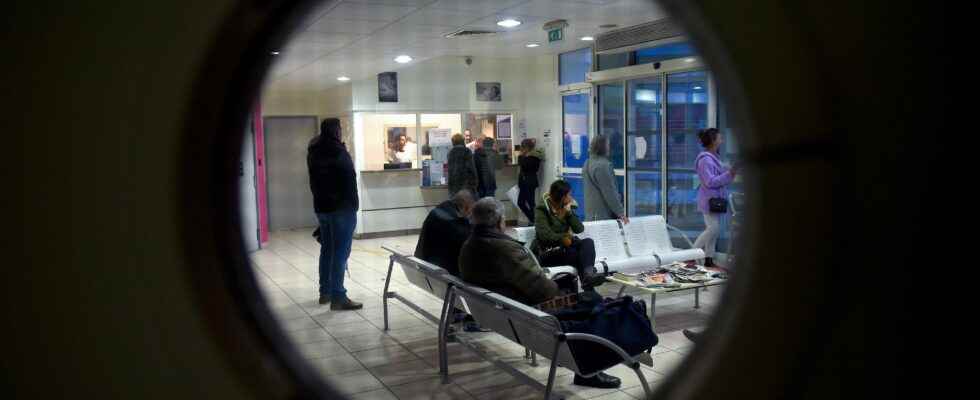The hospital system is currently going through “a week of all dangers” according to the Minister of Health, François Braun, visiting a hospital in Haute-Savoie this Wednesday, December 28. As the French gather to spend the holidays – Christmas then the New Year – with family or friends, French hospitals are still facing a triple epidemic of bronchiolitis, Covid-19 and influenza – cases linked to the latter are exploding . The establishments also suffer from a severe lack of staff, which weakens the ability of the structures to deal with increasingly violent epidemics.
For the past two weeks, an improvement in the epidemic dynamics has been observed for two of these viruses. The ninth wave of Covid-19 continue its descent, which began ten days ago: 41,000 cases of positive Covid were identified as of December 24, or 25% less than the previous week. On the bronchiolitis side, the epidemiological report of Public Health France indicates a “continued reduction in emergency room visits and hospitalizations […] in children under 2 years old in mainland France for the third consecutive week”. But the epidemic is still evolving “at a high level” in mainland France, Guadeloupe, Martinique and Mayotte.
These declining curves are, however, compensated by the cases of influenza, which continue to soar. Santé Publique France reports, throughout France, a “continued increase in influenza indicators in all age groups”, according to its most recent data published on December 28. Last week, hospitalizations for flu-like illness had increased by 75%. Whatever its evolution, this explosion is already “that the resuscitation services in a global way are saturated”, underlined François Braun.
Not a one-off event but “a fundamental problem”
Beyond the number of cases, “it is also the severity of hospitalizations that weighs on the system”, indicates Professor Matthieu Revest, director of the infectious diseases department at the Rennes University Hospital. “Lately, serious Covids were due to contamination which reinforced pre-existing pathologies. But currently we find ourselves with serious cases similar to those at the start of the epidemic, young people without comorbidities who end up in intensive care. This could be due to the evolution of the variants in the face of which our immunity must still adapt”, he develops. “The same for the flu: it has been a very long time since we have seen such severe forms which lead to hospitalizations”, testifies the infectiologist. He adds that “the hospital is in any case a fortnight behind on the contamination curve: we therefore accuse today of the peak of contaminations of two weeks ago”.
The Minister was on Wednesday visiting the Annecy Genevois hospital center in Haute Savoie. Like the whole of the French system, the latter is affected by difficulties, in particular a lack of personnel, noted the minister. “This week is a bit of a week of all dangers, but the mobilization of personnel is absolutely complete and the system manages to hold up,” he assured. “The use of this expression gives the impression of a one-off event that will eventually pass, while we are facing a fundamental problem which is the lack of personnel, reacts Professor Matthieu Revest. We were already unable to operate before this triple epidemic: the pace of care and operations has never returned to normal since the Covid. We are constantly falling behind.”
“This impossibility for the hospital to absorb the number of patients is not an exception linked to the epidemic situation and will be repeated in the future. Where it would currently be necessary to train 1.9 doctors to replace those who leave, we let’s form 0.9″, he recalls. On December 23, the president of Samu-urgence France had also launched a cry of distress and delivered alarming figures. “The 15 centers are overstretched and the emergency services completely overcrowded,” he warned, noting a 55% increase in activity compared to the same week in 2021. The triple epidemic is certainly partly responsible for the situation current. But he also pointed to the closures of 15 to 20% of hospital beds because of “problems of medical demography in the hospital world”. “Emergency services can no longer empty themselves, because there are no hospital places,” he explained.
Faced with infectious epidemics, accepting uncertainty
During his trip, the minister deplored the strike movement of general practitioners at the national level, and liberal nurses in Haute-Savoie, finding it “particularly unwelcome in this period of extreme difficulty for the health system”.
Reminding all French people of the need to be careful during this holiday season, the Minister of Health also said he “feared an epidemic rebound” in January, as has been the case in previous years with the Covid-19. On the flu side, the explosion of early cases is comparable to that of the 2018-2019 epidemic, which had evolved at the same pace with a few days lag, and had reached its peak, that is to say the current level. , at the same period.
“We must accept that the evolution of infectious disease epidemics is now much more uncertain than it was. We are no longer on the classic pattern of an epidemic that lasts two months with a plateau of six weeks. “, notes Matthieu Revest. “We have been trying to predict the evolution of epidemics for three years, without having any control over it, adds the infectiologist. We must accept this part of uncertainty, and integrate the fact that health precautions, the vaccine and the habits of gestures barriers during epidemic episodes must be part of our lives and become a lasting habit.”
